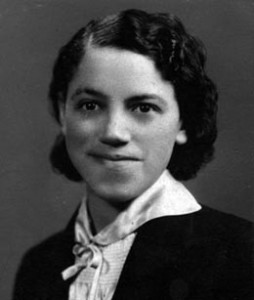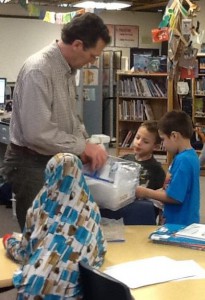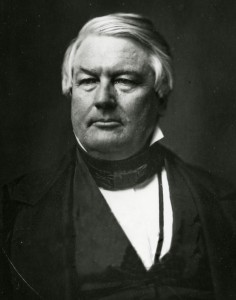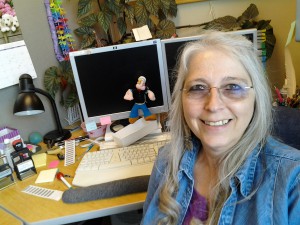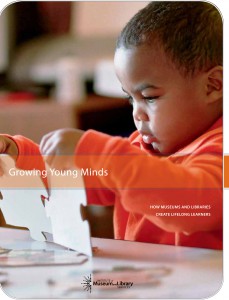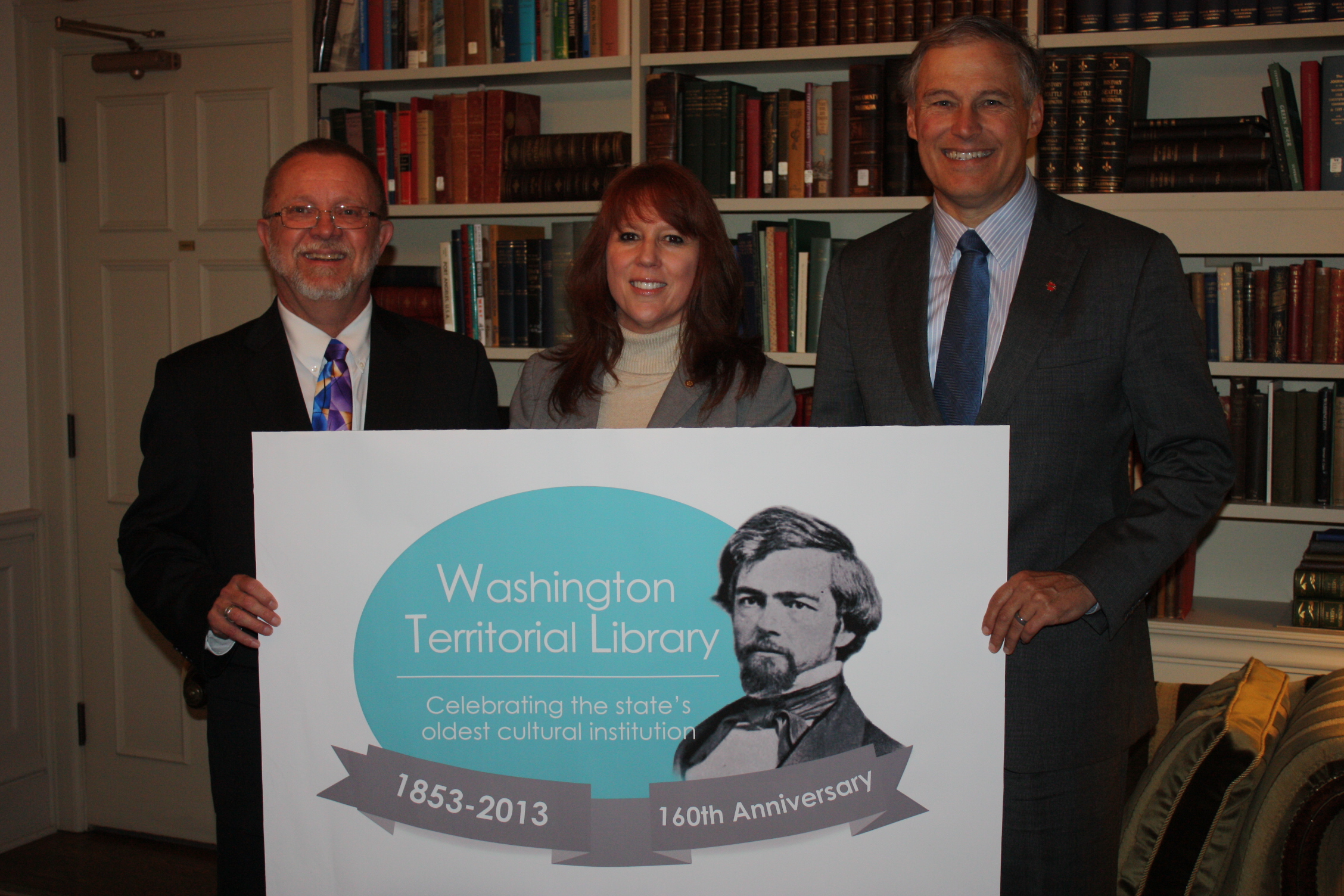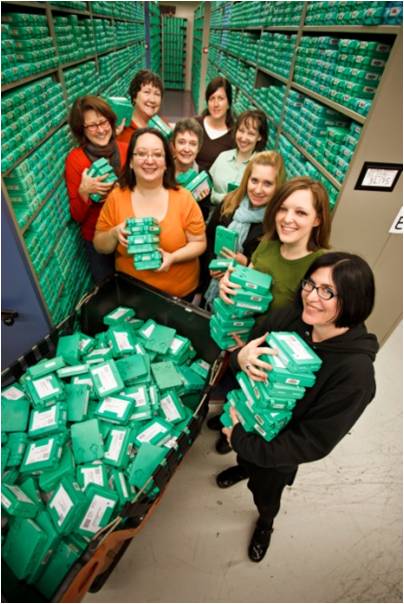 Volunteers working at WTBBL
Volunteers working at WTBBLSeptember 18, 2013
Today we recognize the many volunteers in the Olympia area who work in the Washington State Library and Washington State Archives. There will be a celebration this afternoon in the Governor’s Mansion to simply say, “thanks.”
Washington State Library volunteers are not a luxury. They are a necessity. State Librarian Rand Simmons noted, “They help us to better meet our customers’ needs by providing services we wouldn’t otherwise be able to afford.”
Without volunteers we would not be able to offer such robust services in our Central Library, located in Tumwater, or in our Seattle Washington Talking Book & Braille Library (WTBBL).
Steve Willis, Manager of the Central Library says, “We treat them in the same way we hire staff. We talk with them about their interests and skills and look for a good fit with the opportunities available.”
We have an amazing crew of volunteers at the Talking Book & Braille Library — more than 400 who donate over 30,000 hours each year. The WTBBL volunteers work in areas such as book recording, braille transcription, and other library services. Our WTBBL customers are located throughout the state and materials are sent and returned through the US Mail system by our shipping and circulation volunteers.
In our Digital and Historical Collections program we have three projects involving volunteers. The main project is the indexing of historical newspapers. Volunteers view each page of the newspaper and enter keywords into a database so that researchers can find the articles they need. This labor intensive work makes our online newspapers more searchable.
The newest project is the conversion of some of the historical digital collection to braille. Volunteers are converting selected titles to text files and correcting the text misread by the Optical Character Recognition (OCR) software. Once this is done, the files will be sent to the Washington Talking Book & Braille Library to be converted to braille. This project is bringing our online material to a wider audience.
Judy Pitchford comments that “Both projects require a lot of reading of historical material, which is what these volunteers appear to love the most.”
Our National Digital Newspaper Program has a goal to upload 300,000 pages of historic Washington newspapers to the Library of Congress’ Chronicling America website by mid-year 2014. Our volunteers are often history and newspaper enthusiasts willing to help correct key terms misread by Optical Character Recognition (OCR) software and improve the search results.
Project manager Shawn Schollmeyer says, “The editing they do helps us meet and improve on standards set by the Library of Congress and contributes to online resources used by genealogists and historians everywhere.” We are currently seeking volunteers for this project. Volunteer Rhonda Fabert encourages others to volunteer for the project, “If you are someone who enjoys incredibly interesting work that will benefit generations to come, I highly recommend that you call Shawn Schollmeyer to arrange your own volunteer opportunity with this very prestigious project.”
Gordon Russ is helping to create a database of the library’s historic ephemera files. In doing so, Gordon is improving future subject and keyword access to this extremely useful collection for researchers of Washington State history.
The State Library receives many requests from family genealogists for newspaper obituaries. While we have lost our capacity to fill requests from out-of-state individuals because of staff reductions, the contribution of volunteers enables us to continue to fill in-state requests.
The historic Northwest card file, housed in 180 card catalog drawers, is being converted to an online format by volunteer David Lane. The resulting online database will be available to genealogists, researchers, and historians. The work is slow because each card, an estimated 172,000 of them, must be entered into an Access database which is then made available online.
Rhonda Fabert also created a database of microfilm vendors which allows library staff to more efficiently identify sources of given microfilm titles.
“It is a win-win situation when the library benefits from the volunteers’ work and the volunteers’ experience enriches their lives,” notes Volunteer Coordinator, Marilyn Lindholm.
Rhonda wrote about her volunteer experience, “I’ve experienced an incredible amount of personal and professional growth through interactions with the dedicated staff of WSL over the past year. The project entrusted to me was to design a database which will make access to serials microfilm vendor information quicker and easier. I am delighted to have had the experience of working with Technical Services Supervisor, Shirley Lewis, and look forward to the project’s completion.”
A retired State Library employee and former federal depository specialist, Carol Estep, assists our staff who work with federal publications by doing a wide variety of duties. Her faithfulness helps us bridge the gap left by staff reductions.
Motivation to volunteer varies with each individual. Michele Weaver wrote, “I want to thank the Washington State Library for giving me the opportunity to ‘give back’ as a genealogy research volunteer finding obituaries for patrons. Having done genealogy research for many years on my own family, I know how frustrating it is to hit the proverbial ‘brick wall’, and get stalled with your research. Through the years I have had some kind people do research for me, and I love the thought that I am ‘paying it forward’ by finding obituaries for State Library patrons, and filling in holes in some family trees.”
How do people come to volunteer? The paths are many. Gordon Russ has volunteered for the State Library for about 10 years. He got his start by sending an email to the State Librarian after reading a newsletter article that featured the Oregon Railroad and Navigation Company, a subject of particular interest to him as he collects railroad-themed books. The article mentioned that some of the documents would be digitized so he thought he might help with that process.
One thing led to another and he began volunteering for what is now the Digital and Historical Collections Program. Then, one night while reading in bed, he dropped a book he was reading and the spine broke.
Knowing that the State Library had a preservation program, he asked its program manager, Diane Hutchins, how he might repair the book. She pointed him to the “Conservation Kitchen,” a YouTube tutorial developed by State Library staff. That led him to a stint helping the State Library preserve rare materials including some of Governor Isaac Stevens’ books along with maps, photographs, and other rare items dating as far back as the 15th century.
Gordon loves history and that love is evident as he tells colorful stories about Washington. We appreciate his dedication to helping the State Library preserve the history of the state of Washington.
Want to explore volunteer opportunities at the Washington State Library? Please contact Marilyn Lindholm at [email protected] or 360.704.5249.
How do volunteers benefit those of us who work in the State Library? Marilyn Lindholm said it best, “Our volunteers bring creative ideas and a fresh perspective to how we do business.”
Thank you, Kendall Brookhart, Kathie Dexter, Carol Estep, Rhonda Fabert, Karen Fieldman, David Lane, Barb Monti, Brynn Pitchford, Anissa Rajala, Gordon Russ, Kelly Sjoblom, Amelia Turnbull, Michele Weaver, and Mary Webster. Your skills, expertise and service are invaluable in helping us meet the needs of our customers.






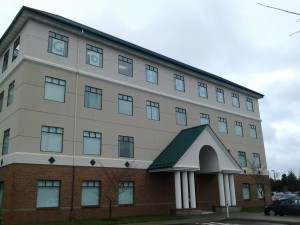
![Mr. Jackson is shown in the Illustrated History of Mason County, by Susan Olsen and Mary Randlette (1978) Additional information on Dick Jackson can be found in the rise and decline of the Olympia oyster, by E. N. Steele [Elma, Wash., Fulco Publications, 1957]](https://blogs.sos.wa.gov/library/wp-content/uploads/2014/03/persevering-the-history-and-culture-3_img_0-229x300.jpg)

